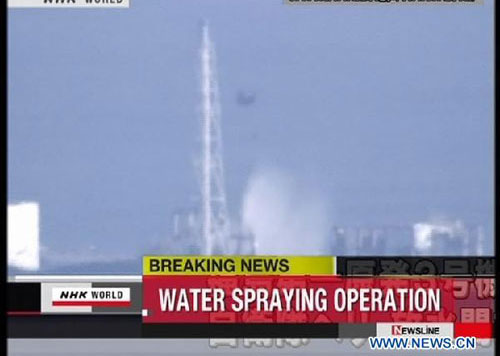Japanese military helicopters dumped tons of water towards the stricken Fukushima nuclear power plant Thursday morning in an effort to avert a possible nuclear meltdown.

This still image taken from news program by NHK on March 17, 2011 shows a helicopter spray water on the reactors of Japan's troubled Fukushima No. 1 nuclear power station. Helicopters were sent by Japan's self-defense force on Friday to cool down the reactors of Fukushima No. 1 nuclear power station. (Xinhua/NHK)
Fires struck the No.4 reactor of the Fukushima Daiichi plant on Tuesday and Wednesday, triggering fears of a catastrophic radiation leak from spent fuel rods.
Live images from public broadcaster NHK showed helicopters are hovering over the No.3 reactor, pouring more than seven tons of water from huge buckets in a bid to douse fuel rods. Efforts to douse the No.4 reactor will soon follow.
Dropping water on the overheating fuel rods is no easy task.
The high radiation levels above the reactors have prevented the planes from staying static or flying at a low altitude, making the operation even more difficult, NHK reported.
Also on Thursday, a total of 11 water cannon trucks were deployed at the crippled nuclear facility to help douse the reactor's spent fuel rods, Kyodo news agency said.
If the cooling work does not proceed well, Japan's radiation crisis will escalate to a critical level, an agency official said.
In face of the spiraling nuclear crisis, Tokyo Electric Power Co.(TEPCO), operator of the quake-shaken nuclear units, announced Thursday it would take all measures to bring power back to the plant and restore the cooling systems.
TEPCO said it planned to restore outside power lines from Tohoku Electric Power Co. and then connect its damaged electric transmission system with unaffected lines.
As officials resorted to a patchwork of fixes to avoid full meltdowns, U.S. Nuclear Regulatory Commission Chairman Gregory Jaczko warned one reactor cooling pool for spent fuel rods might have run dry and another was leaking.
His words were denied by the TEPCO, which claimed the "condition is stable" at No.4 unit.
Reactors in the No.5 and No.6 units were also out of operation and the temperature of storage pools was going up, NHK reported.
The crisis at several reactors of the Fukushima Daiichi plant were set off when last Friday's earthquake and tsunami knocked out power needed for their cooling systems and ruined backup generators.
There have been three explosions and two fires at the plant. Two hydrogen explosions rocked No.1 reactor and No. 3 reactor on Saturday and Monday respectively due to the failure of the cooling function, damaging the outer walls.
A third blast occurred at the No.2 reactor and damaged the reactor's suppression pool on Tuesday morning, raising radiation in the area to dangerous levels.
Yukiya Amano, head of International Atomic Energy Agency (IAEA), announced Thursday he would head to Japan to seek first-hand information of the crisis and summon an extraordinary meeting of the IAEA's 35-nation governing board after returning to Vienna.
Amano's announcements of his trip and the IAEA board session revealed his growing concern about the radiation crisis in his home country.
The Japanese government Monday asked the U.N. nuclear watchdog to provide experts to help it deal with the incidents at the Fukushima Daiichi power plant.
VietNamNet/Xinhuanet


























